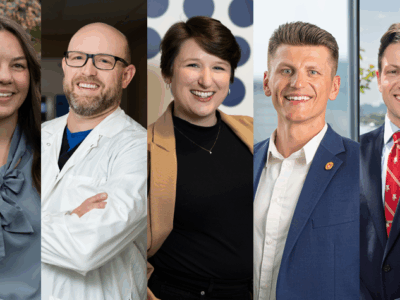15
September

Alumnus Abhijit Gadkari uses patient-reported data to evaluate health outcomes in industry
By Katie Ginder-Vogel
“Patients and clinicians can have quite different perceptions of disease control,” says Abhijit Gadkari (MS ‘06, PhD ’09), senior director, Health Economics and Outcomes Research at Regeneron, a biotechnology company based in Tarrytown, New York. Patients experience their conditions first-hand, including the sleepless nights caused by symptoms like itching or pain, and other impacts of disease and treatment on their quality of life. Clinicians, on the other hand, can rely only on what symptoms they see, and what lab tests reveal.
Gadkari focuses his work on combining these two perspectives to study health outcomes, leveraging a breadth of health care data to assess treatment effectiveness for pharmaceutical companies.
Some of his research has led to the development of a patient-reported outcome measure of disease control that dermatologists can use to determine whether patients with severe eczema can control their symptoms based on their existing therapy or whether their treatment needs to be escalated.
“This facilitates a conversation between patient and clinician on what aspects of disease control are important for them,” Gadkari explains.
He earned his bachelor of science in pharmacy in India, and he wasn’t quite sure where his career would take him when he left Mumbai to attend the University of Wisconsin–Madison School of Pharmacy. He did know, however, that he wanted to improve patients’ outcomes through analysis of health care data, instead of donning a lab coat.
Health services research
“I knew I wanted to pursue graduate studies in a school of pharmacy, and the UW–Madison School of Pharmacy’s graduate program has a very good reputation within international academic pharmacy circles,” Gadkari says. “My major advisor and primary mentor, Dr. David Mott, provided me with a positive, nurturing environment throughout my tenure at the UW, and that has gone a long way in carrying my career forward,” he says.
Knowing he preferred data visualization and patient interaction to laboratory work, Gadkari enrolled in the School’s Social and Administrative Sciences in Pharmacy degree program, now called Health Services Research in Pharmacy (HSRP), which integrates knowledge of pharmacy and medication with the social sciences to understand and improve interactions among patients, medicines, caregivers, and health care systems.
“The HSRP graduate program draws different fields together — pharmacy, public health, sociology, psychology, economics — into a melting pot of complementary disciplines,” he says
While the vast majority of HSRP graduates enter academia and continue researching and impacting policy around medication use and safety, Gadkari chose to approach the same problem from the other side of the aisle.
“I like how the research in industry is applied to real-world problems,” he says. “It is interesting to take an issue relevant to health care, work on a solution, and be able to see the impact of those results firsthand, rather than waiting for things to take their course.”
Towards the end of his graduate program, Gadkari gravitated toward industry, hoping to leverage his data analysis skills, interact with people from a wide variety of disciplines, and apply research directly to real-world problems. Professor Emeritus Dave Kreling, then chair of the Social and Administrative Sciences Division, connected him to an ex-UW colleague, who was then recruiting for a position at Merck, and that’s how he landed his first job.
“My first job at Merck had a strong emphasis on my dissertation research, which was around medication adherence in Medicare beneficiaries,” says Gadkari. “It was a clear transition from the School of Pharmacy to Merck.”
Patient focus
Patients have improved outcomes when they continue taking medications that are safe and effective, Gadkari says, and pharmaceutical companies have incentive to ensure patients continue to take their medications under clinical supervision assuming they are seeing progress.
“Adherence is a win-win-win for patients, physicians, and pharma,” he says. “My research helped clinicians understand reasons for non-adherence, so that the patient and clinician can discuss and address them.”
Gadkari spent three and a half years at Merck, and then spent a couple of years at Bayer before joining Regeneron, where he’s now been for the past five years. He was drawn to Regeneron — founded by a scientist who was motivated to bring the drugs he developed to patients —because of its commitment to scientific research.
“Adherence is a win-win-win for patients, physicians, and pharma.”
–Abhijit Gadkari
“Regeneron is a mid-sized biotech company that is on the cutting-edge of research in biopharmaceuticals,” says Gadkari. His role at the company weaves patient perspectives into the outcomes measured in clinical trials as well as in real-world clinical practice.
For example, Gadkari incorporated patient perspectives into a disease control tool he developed for patients with severe eczema and their dermatologists, which continues to impact assessments by clinicians in the real world. His work has also led to the inclusion of patient reported outcomes data, such as itch severity for patients with moderate to severe atopic dermatitis, on the U.S. label for Dupilumab, a Regeneron-manufactured medication.
“As you progress in industry, you take on more responsibilities, manage a broader portfolio of projects, and get more involved in clinical development and clinical interactions,” Gadkari says.
His focus on the patients’ viewpoint traces back to his time in graduate school at the School of Pharmacy, where he took several graduate classes with Professor Betty Chewning and worked with her as a teaching assistant for several years.
“Dr. Chewning is an expert on research involving patient-reported outcomes, and in working with her, I got motivated to leverage the patient’s voice in my subsequent work,” says Gadkari.
Real-world impact
Gadkari’s day-to-day responsibilities at Regeneron are divided into three areas: research, publications, and meetings. He works with colleagues on study design and methods, understanding results, and interpreting data. He says there’s an emphasis in industry on producing high-quality publications, so he spends considerable time reviewing manuscript drafts and presenting data at medical congresses.
He also holds frequent meetings with his internal colleagues and stakeholders to understand research issues and formulate effective studies.
“As you design a study, you need to keep your focus on where the need or the gap in understanding is,” he says. “That helps you design studies that are beneficial and impactful.”
Gadkari’s work in health outcomes covers several key areas.
“We look at disease burden in terms of symptoms and quality of life and do a lot of work with epidemiology to understand the prevalence of diseases that would be of interest to a company,” he explains.
In addition to patient-reported data, Gadkari and his colleagues also conduct more traditional health outcomes research, by evaluating the effectiveness of drugs as evidenced in secondary claims databases.
“Unlike primary data, these are data that are not collected with the primary goal of research,” he explains. “Typical secondary claims data are medical records or insurance claims that get collected as part of routine clinical practice and subsequent reimbursement by insurance companies.”
The insights Gadkari and his team uncover feed into how clinical trials are run, such as in identifying which outcomes are important to assess in trials. They also help determine the “value,” or price, of a product, based on cost-effectiveness analyses. Importantly, the results of their analyses also translate into publications to help advance understanding and research beyond the company’s labs.
“People would be surprised by how much we publish in industry,” he says. “All of our work gets published and presented at congresses. Understanding data drives future research and clinical development programs.”
Gadkari regularly publishes in top-tier journals.
“I think I’ve been fortunate to publish in high-tier journals,” he says. “The clinical development programs I was involved in were published in the New England Journal of Medicine and Lancet.”
Strong foundation
As much as he thrives on research, Gadkari also appreciates the opportunity to interact with a wide range of professionals involved in health care, from scientists, clinicians, and medical directors to those running the commercial side of things with a business mindset.
“I’m fortunate to have good, meaningful friendships and collaborations at my workplace,” he says. “For me, that goes back to the UW–Madison School of Pharmacy, where it was easy to form lasting friendships.”
“It is interesting to take an issue relevant to health care, work on a solution, and be able to see the impact of those results firsthand.”
–Abhijit Gadkari
Gadkari says his graduate research at the School also set him up to continuously build on that base of knowledge as he developed his career.
“I kept on top of the skill sets I’d need to advance my career,” he says. “It’s important to me to stay in tune with where the field is going and keep developing my skill set.”
Gadkari believes School of Pharmacy HSRP graduates who, like him, are interested in less traditional paths, are just as set up for success as those who plan to tackle these issues from academia.
“Within the context of health services research, having a good understanding of research design and strong analytic skills are critical, and School of Pharmacy HSRP graduates find strong placements because the curriculum has an emphasis in these two key areas,” Gadkari observes. “The School’s programs offer the right tools to its graduates to fit a wide range of career choices.”
Learn about another Heath Services Research in Pharmacy alumnus using research to improve outcomes: Ephrem Abebe (MS ’14, PhD ’16).
Read about the School of Pharmacy’s recently refreshed Health Services Research in Pharmacy graduate program.




